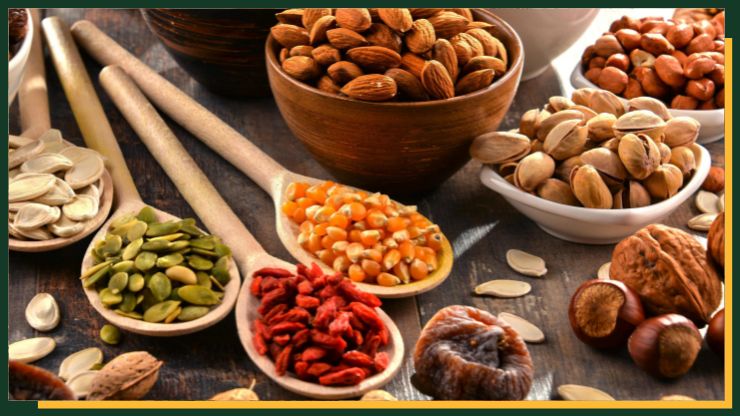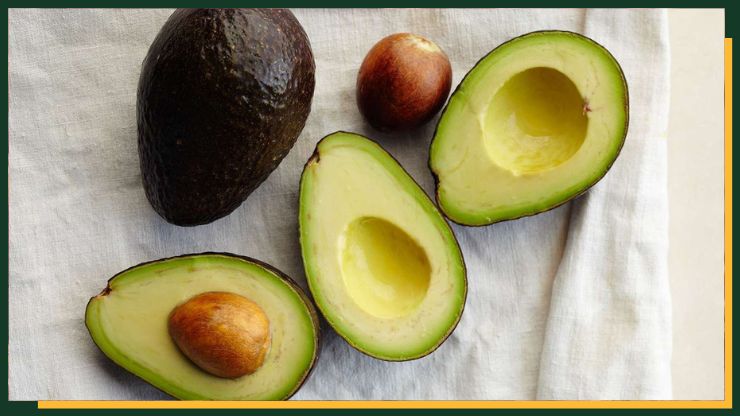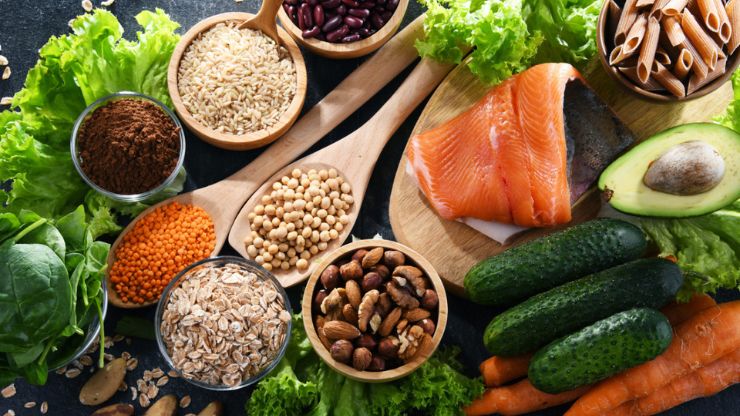Foods for Stable Blood Sugar Levels – Maintaining stable blood sugar levels is essential for overall health and well-being. Blood sugar, or glucose, serves as the body’s primary source of energy, and its regulation is crucial to prevent a range of health issues, particularly for those at risk of diabetes or managing the condition.
Diet plays a pivotal role in managing blood sugar levels, making it imperative to understand which foods can help stabilize them.
This article explores the key factors influencing blood sugar, including the types of carbohydrates, fiber, proteins, and fats in our diet. We will discuss the foods that promote stable blood sugar levels, such as complex carbohydrates, high-fiber options, lean proteins, and healthy fats.
Additionally, we’ll provide practical meal planning and cooking tips to help you make informed choices and maintain your blood sugar within a healthy range.
By incorporating these dietary guidelines, you can take control of your blood sugar and work towards better health, increased energy, and reduced risk of metabolic disorders.
Table of Contents
ToggleDefinition and importance of stable blood sugar levels
Stable blood sugar levels, also known as glucose levels, refer to the consistent and balanced concentration of sugar (glucose) in the bloodstream. These levels are regulated by the body’s intricate system involving hormones like insulin and glucagon, and they play a vital role in maintaining overall health. The importance of stable blood sugar levels can be summarized as follows:
- Energy Regulation: Glucose is the primary source of energy for the body’s cells and tissues. Stable blood sugar levels ensure a steady and reliable energy supply, preventing energy spikes and crashes.
- Brain Function: The brain is particularly sensitive to fluctuations in blood sugar. Stable levels are crucial for optimal cognitive function, concentration, and mental clarity.
- Weight Management: Balanced blood sugar levels can help control appetite and reduce overeating, which is essential for maintaining a healthy weight.
- Diabetes Management: For individuals with diabetes, stable blood sugar levels are the cornerstone of effective disease management. High or low blood sugar levels can lead to complications, so keeping them stable is crucial.
- Mood and Emotional Well-being: Blood sugar fluctuations can affect mood, leading to irritability, anxiety, or even depression. Stable levels can contribute to emotional stability.
- Long-term Health: Prolonged high blood sugar levels can damage blood vessels and organs, increasing the risk of cardiovascular disease, kidney problems, nerve damage, and other complications. Maintaining stability is key to preventing these issues.
- Prevention of Hypoglycemia: Low blood sugar (hypoglycemia) can be dangerous, leading to dizziness, confusion, and even loss of consciousness. Stable blood sugar levels help prevent such episodes.
Also, Read – Delicious Foods that Help Digestion
Foods for Stable Blood Sugar Levels
Whole Grains

Whole grains like whole wheat, brown rice, quinoa, and oats are rich in fiber and nutrients, offering a steady source of energy. Their high fiber content helps slow down the absorption of sugar, preventing rapid blood sugar spikes and promoting stable levels. This makes them an excellent choice for individuals looking to maintain healthy blood sugar levels.
Non-Starchy Vegetables

Non-starchy vegetables such as broccoli, spinach, kale, and bell peppers are low in carbohydrates and high in fiber. These qualities make them ideal for stabilizing blood sugar levels. Their low carbohydrate content means they have a minimal impact on blood sugar, while their high fiber content promotes a feeling of fullness and slows down the absorption of sugar.
Incorporating non-starchy vegetables into your meals can help maintain steady blood sugar levels and support overall health, making them a valuable addition to a balanced diet, especially for individuals with diabetes or those aiming to control their blood sugar.
Legumes

Legumes, which include beans, lentils, and chickpeas, are nutrient-rich powerhouses known for their ability to stabilize blood sugar levels. They are high in both fiber and protein, which work together to slow down the digestion of carbohydrates and the absorption of sugar.
This helps prevent sudden spikes in blood sugar and provides a sustained release of energy. Legumes also have a low glycemic index, making them a smart choice for individuals seeking to manage their blood sugar effectively.
Their versatility makes them easy to incorporate into various dishes, making them a valuable component of a balanced diet, especially for those with diabetes or those looking to improve blood sugar control.
Also, Read – High Protein Breakfasts
Lean Proteins

Lean proteins, such as chicken, turkey, fish, tofu, and lean cuts of beef or pork, play a crucial role in stabilizing blood sugar levels. They are low in carbohydrates and rich in high-quality protein, which helps control hunger and regulate glucose.
Protein can slow down the digestion of food, preventing rapid spikes in blood sugar after meals. Additionally, lean proteins offer essential nutrients without the excess saturated fats often found in fattier cuts of meat.
Including these lean protein sources in your diet can aid in managing blood sugar levels and promoting overall health, particularly for individuals with diabetes or those looking to maintain stable blood sugar.
Nuts and Seeds

Nuts and seeds, such as almonds, walnuts, chia seeds, and flaxseeds, are excellent choices for stabilizing blood sugar levels. They are rich in healthy fats, fiber, and protein, which collectively slow the absorption of carbohydrates and sugar, preventing blood sugar spikes.
The healthy fats in nuts and seeds can also help improve insulin sensitivity. Moreover, they provide a feeling of fullness and sustained energy, making them a valuable snack or addition to meals for individuals seeking to manage blood sugar effectively.
However, portion control is crucial, as they are calorie-dense. Including a variety of nuts and seeds in your diet can contribute to better blood sugar control and overall well-being.
Berries

Berries, such as strawberries, blueberries, and raspberries, are not only delicious but also great for maintaining stable blood sugar levels. They are lower in sugar compared to many other fruits, making them a smart choice for those concerned about blood sugar control.
Don't just scroll, subscribe!
BuzzTrail's unique web-stories are the cure for boredom you've been waiting for.
Berries are high in fiber, antioxidants, and phytochemicals that can slow down the absorption of sugar and reduce the risk of blood sugar spikes. Their natural sweetness can satisfy your sweet tooth without causing drastic fluctuations in glucose levels.
Incorporating a variety of berries into your diet can provide a tasty and nutritious way to support blood sugar management and overall health, especially for individuals with diabetes or those looking to reduce sugar intake.
Greek Yogurt

Greek yogurt is a nutritious option for maintaining stable blood sugar levels. It’s higher in protein and lower in sugar compared to regular yogurt, which makes it an excellent choice for individuals looking to manage their glucose effectively.
The protein in Greek yogurt can slow down the digestion of carbohydrates, helping to prevent blood sugar spikes after meals. Additionally, the probiotics in yogurt may have a positive impact on gut health, potentially influencing blood sugar control.
Opt for plain, unsweetened Greek yogurt to keep added sugars to a minimum, and consider adding fresh berries or a sprinkle of cinnamon for extra flavor without compromising your blood sugar management efforts.
Cinnamon

Cinnamon is a flavorful spice that may offer benefits for blood sugar regulation. Some studies suggest that it can help improve insulin sensitivity and lower blood sugar levels, making it a potentially useful addition to the diet for individuals with diabetes or those aiming to stabilize their blood sugar.
Cinnamon can be incorporated into various dishes, from oatmeal and yogurt to tea and baked goods, adding a warm and aromatic touch. However, it’s essential to remember that while cinnamon may provide some benefits, it should not be relied upon as the sole method for managing blood sugar. It should be part of a balanced diet and lifestyle focused on overall health and blood sugar control.
Vinegar

Vinegar, especially apple cider vinegar, has shown promise in helping to regulate blood sugar levels. When consumed with meals, it can potentially lower the post-meal blood sugar response. Vinegar’s acetic acid may improve insulin sensitivity and slow down the digestion of carbohydrates, reducing the glycemic impact of a meal.
To incorporate vinegar into your diet, consider using it in salad dressings, marinades, or even diluting a small amount in water before meals. However, it’s essential to use vinegar in moderation, as excessive consumption may have adverse effects.
As with any dietary change, individuals should consult with a healthcare professional, especially if they have existing medical conditions or are on medications that can interact with vinegar.
Avocado

Avocado is a nutritious fruit known for its role in promoting stable blood sugar levels. It’s rich in healthy monounsaturated fats, which can help slow the absorption of carbohydrates and prevent blood sugar spikes.
Avocado is also low in carbohydrates and high in fiber, contributing to feelings of fullness and steady energy. Its combination of healthy fats and fiber makes it a valuable addition to a diet aimed at blood sugar control.
Avocado can be incorporated into salads, sandwiches, smoothies, or as a topping for various dishes, offering a creamy texture and a subtle, nutty flavor. However, portion control is important due to its calorie content.
Sweet Potatoes

Sweet potatoes are a nutritious choice for individuals seeking to maintain stable blood sugar levels. Despite their natural sweetness, they have a lower glycemic index compared to regular potatoes, which means they have a milder impact on blood sugar.
Sweet potatoes are high in fiber, which helps slow down the absorption of sugar, preventing rapid spikes in blood glucose. They’re also packed with vitamins, minerals, and antioxidants that support overall health.
Incorporating sweet potatoes into your meals can provide sustained energy and satisfy your craving for a sweet taste without compromising blood sugar control. Roasting, steaming, or mashing them are delicious ways to enjoy their earthy and naturally sweet flavor.
Green Tea

Green tea is a popular beverage known for its potential to aid in blood sugar regulation. It contains polyphenols, particularly catechins, that may improve insulin sensitivity and reduce blood sugar levels.
Regular consumption of green tea may help control post-meal glucose spikes. Additionally, it is rich in antioxidants that offer various health benefits. To incorporate green tea into your diet, steep green tea bags or loose leaves in hot water for a few minutes, and enjoy it plain or with a slice of lemon for added flavor.
However, it’s important to avoid adding excessive sugar or honey, as this can counteract its potential benefits for blood sugar control.
Conclusion
In conclusion, maintaining stable blood sugar levels is a fundamental aspect of overall health. It impacts energy, brain function, weight management, and emotional well-being, while also playing a crucial role in diabetes management and the prevention of long-term health complications.
By making informed dietary choices, engaging in regular physical activity, and monitoring blood sugar, individuals can take control of their well-being and reduce the risk of metabolic disorders. Prioritizing stable blood sugar levels contributes to a healthier, more energetic, and fulfilling life.
FAQs
What are stable blood sugar levels?
What are stable blood sugar levels?
Stable blood sugar levels refer to a consistent and balanced concentration of glucose (sugar) in the bloodstream, usually within a healthy range (70-140 mg/dL).
Why is it important to maintain stable blood sugar levels?
Why is it important to maintain stable blood sugar levels?
Stable blood sugar levels are crucial for providing consistent energy, supporting brain function, managing weight, preventing diabetes complications, and maintaining overall health.
What types of foods help stabilize blood sugar levels?
What types of foods help stabilize blood sugar levels?
Foods that are high in complex carbohydrates, fiber, lean proteins, and healthy fats are beneficial for stabilizing blood sugar levels.

